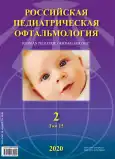Vol 15, No 2 (2020)
- Year: 2020
- Articles: 4
- URL: https://bakhtiniada.ru/1993-1859/issue/view/3376
- DOI: https://doi.org/10.17816/rpoj.2020.15.2
Clinical studies
Regional factors of somatic pathologies in pregnant women and predelivery risk factors for retinopathy in premature infants of the Altai region
Abstract
Despite progress in medicine, the number of preterm births as a result of the use of new reproductive technologies is increasing. Preterm birth is a multifactorial process. The success of neonatal resuscitation in nursing children with extremely low birth weight leads to an increase in the number of surviving children with various ophthalmic pathologies. Retinopathy in premature infants remains one of the urgent problems of pediatric ophthalmology, being one of the leading causes of blindness and low vision in preterm neonates. Premature retinopathy is a multifactorial disease, the incidence and severity of which are due to the influence of many risk factors that adversely affect the immature retina of a premature infant and lead to a violation of its normal vasculogenesis.
Aim. To evaluate the state of health of pregnant women and the connection of this factor with the development of retinopathy among retinopathy prematurity in the Altai Region.
Material and methods. To achieve this aim, statistical compendiums of the Demographic Yearbook in the Altai Region over an 11-year period (from 2005 to 2016) were analyzed, as were the medical histories of infants hospitalized in
“The Altai Regional Clinical Children’s Hospital” during the same period.
Results. Statistically significant differences (p < 0.05) in the incidence of hepatitis and diabetes were discovered. In addition, the most apparent variations, confirming the existence of prenatal risk factors leading to retinopathy in premature infants, were obtained on such indicators as anemia among pregnant women, fetoplacental deficiency, gestational toxicosis, pyelonephritis among pregnant women, and others.
Сonclusions. We detected a significant number of somatic pathologies in pregnant women in the Altai Region, which was considerably higher than the average rates in the Russian Federation. The most remarkable antenatal risk factors for the birth of premature babies developing retinopathy of the premature were highlighted, and these should be taken into account when organizing prophylactic screening measures for the early identification of retinopathy of prematurity in the Altai Region.
 5-10
5-10


Competence-oriented education in ophthalmology
Abstract
Aim. To develop and introduce into the pedagogical practice a competency-oriented education module. It would be included in all professional competencies of the Federal State Educational Standard for OPHTHALMOLOGY.
Material and methods. A nosological form, “retinopathy of prematurity,” was chosen to create the module. The material was created primarily on the basis of Federal clinical guidelines (FKR), “retinopathy of prematurity, active phase.” For the electronic information and educational environment of the university and for contact work, tests and case studies were prepared and competency-oriented tasks were compiled for all 12 professional competencies (PCs) registered in the Federal State Educational Standard for Ophthalmology, dated October 27, 2014 (No. 34470).
Results. The educational module, including all PCs, was developed and introduced into practice in the Department of Ophthalmology at North-Western State Medical University named after I.I. Mechnikov; this can serve as a reference model for the development of similar modules in other important and relevant areas in ophthalmology to enhance both the residency program in ophthalmology and cycles of thematic improvement for practicing ophthalmologists.
Conclusion. The competency-oriented tasks developed for the module are a useful resource in both learning and evaluation of residency programs in ophthalmology and thematic improvement of ophthalmologists.
 11-14
11-14


Clinical recommendations
Strategy for correcting congenital progressive high myopia with astigmatism
Abstract
The article presents a strategy for optical correction of congenital progressive high myopia with astigmatism, including bioptic correction with a combination of soft contact lenses and glasses. First, monofocal soft contact lenses are selected in accordance with the spherical component, and then the residual astigmatism is determined and correct with additional cylindrical glasses with perifocal refractive gain. This allows correcting both the central and peripheral defocus simultaneously.
 15-18
15-18


Case reports
А clinical case of WAGRO syndrome
Abstract
WAGRO syndrome is a rare genetic syndrome that includes Wilms’ tumor, aniridia, genitourinary system abnormalities, mental retardation, and obesity. The syndrome is associated with deletions of the short arm of chromosome 11 (11p), where the PAX6 and WT1 genes are located. We present the clinical case of a 7-year-old boy with aniridia, polar cataract, and concomitant neuromotor, psychomotor, and speech delays. Evaluation of the child’s karyotype followed by confirmation using multiplex ligation-dependent probe amplification showed the presence of a deletion including in the 11p13-p14 region.
 19-24
19-24








